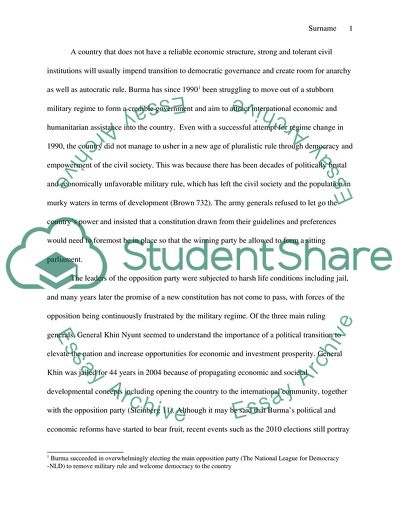Cite this document
(“Political Liberalization in Burma Essay Example | Topics and Well Written Essays - 1500 words”, n.d.)
Political Liberalization in Burma Essay Example | Topics and Well Written Essays - 1500 words. Retrieved from https://studentshare.org/politics/1595535-course-name-southeast-asia-dilemma-and-development-topic-is-burmas-political-liberalisation-to-be-continued-below
Political Liberalization in Burma Essay Example | Topics and Well Written Essays - 1500 words. Retrieved from https://studentshare.org/politics/1595535-course-name-southeast-asia-dilemma-and-development-topic-is-burmas-political-liberalisation-to-be-continued-below
(Political Liberalization in Burma Essay Example | Topics and Well Written Essays - 1500 Words)
Political Liberalization in Burma Essay Example | Topics and Well Written Essays - 1500 Words. https://studentshare.org/politics/1595535-course-name-southeast-asia-dilemma-and-development-topic-is-burmas-political-liberalisation-to-be-continued-below.
Political Liberalization in Burma Essay Example | Topics and Well Written Essays - 1500 Words. https://studentshare.org/politics/1595535-course-name-southeast-asia-dilemma-and-development-topic-is-burmas-political-liberalisation-to-be-continued-below.
“Political Liberalization in Burma Essay Example | Topics and Well Written Essays - 1500 Words”, n.d. https://studentshare.org/politics/1595535-course-name-southeast-asia-dilemma-and-development-topic-is-burmas-political-liberalisation-to-be-continued-below.


